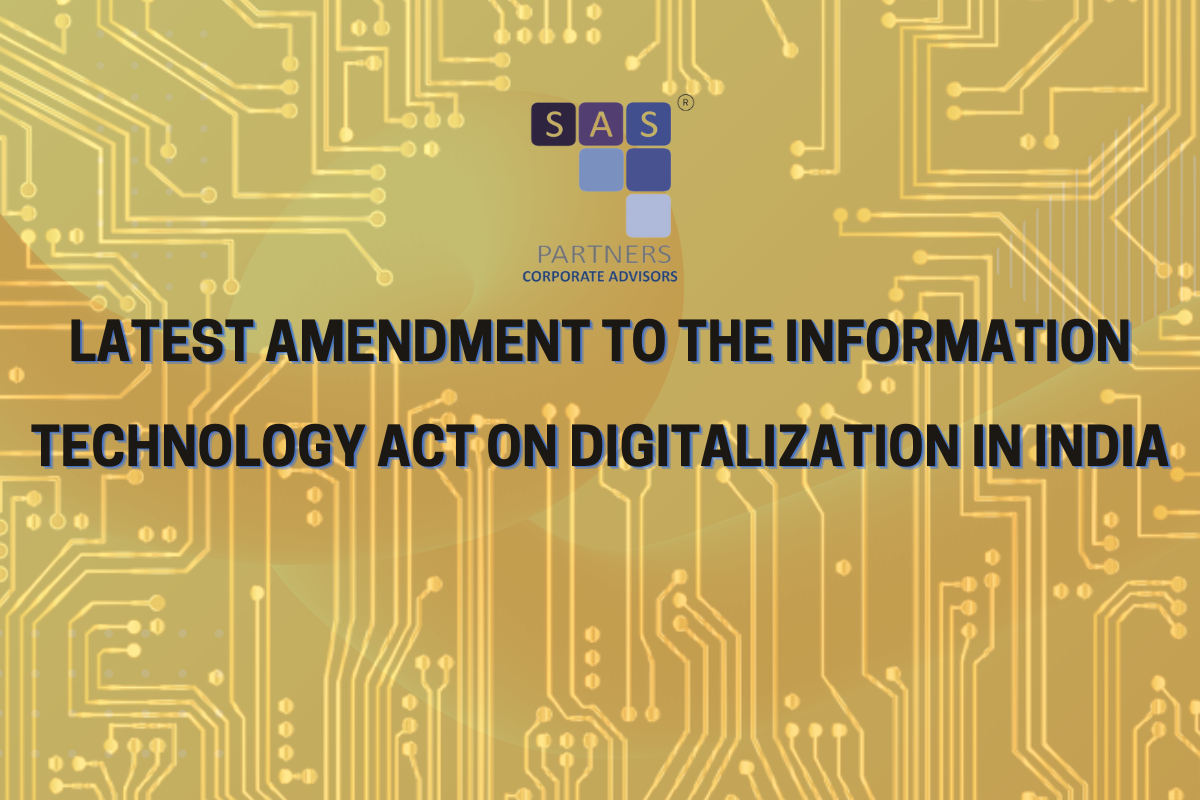Impact of the Latest Amendments to the Information Technology Act on Digitalization in India
The Ministry of Electronics and Information Technology has recently taken a significant stride towards bolstering the efforts for digitalization of transactions in India by amending the First Schedule of the Information Technology Act, 2000 (“IT Act”). The First Schedule of the IT Act lists the category of documents to which the IT Act does not apply and consequently electronic/digital signatures cannot be used for the execution of such documents.
Following the recent amendment to the First Schedule of the IT Act, vide notification dated September 26, 2022 (“Amendment”), the below-listed category of documents have been brought within the ambit of the IT Act, thereby permitting electronic/ digital execution of the same:
Sl. No |
Type of Document |
Impact of the Amendment |
| 1 | Any contract for the sale or conveyance of immovable property or any interest in such property. | The omission of this entire category from the First Schedule is the most significant change brought about through this recent Amendment. Before the Amendment, affixing of a wet signature was essential for executing documents pertaining to immovable property, such as Sale Deeds, Agreement to Sell, Mortgage Deeds, Lease Deeds etc.
Subsequent to the Amendment parties are permitted to enter into such contracts by affixing electronic/ digital signatures. This will ease the process of contract execution related to immovable properties to a great extent, especially in cases where parties are in two different geographical locations. |
| 2 | A cheque, a Demand Promissory Note or a Bill of Exchange issued in favour of or endorsed by an entity regulated by the Reserve Bank of India, National Housing Bank, Securities and Exchange Board of India, Insurance Regulatory and Development Authority of India and Pension Fund Regulatory and Development Authority) as defined in section 13 of the Negotiable Instrument Act, 1881 (26 of 1881) | Prior to the Amendment, the cheque was the only category of a negotiable instrument to which the IT Act was applicable.
Post the Amendment, in addition to the cheque, a Demand Promissory Note or Bill of Exchange (BoE) issued in favour of or endorsed by any of the following entities will also come under the ambit of the IT Act:
a) an entity regulated by the Reserve Bank of India b) National Housing Bank c) Securities and Exchange Board of India d) Insurance Regulatory and Development Authority of India e) Pension Fund Regulatory and Development Authority Consequently, electronic versions of such negotiable instruments and digital/electronic signatures on such negotiable instruments shall be valid. |
| 3 | Power-of-attorney that empowers an entity regulated by the Reserve Bank of India, National Housing Bank, Securities and Exchange Board of India, Insurance Regulatory and Development Authority of India and Pension Fund Regulatory and Development Authority to act for, on behalf of, and in the name of the person executing them. | While the First Schedule of the IT Act had excluded all categories of power of attorney (PoA) from its applicability, post this Amendment any power of attorney under the below-mentioned categories will fall within the ambit of the IT Act.
Any PoA that empowers any of the below-listed entities to act for, on behalf of, and in the name of the person executing them: a) an entity regulated by the Reserve Bank of India b) National Housing Bank c) Securities and Exchange Board of India d) Insurance Regulatory and Development Authority of India e) Pension Fund Regulatory and Development Authority Consequently, electronic versions of any such PoA and digital/electronic signatures on any such PoA shall be valid. |
It must however be noted that all negotiable instruments and PoA executed inter se individuals remain excluded from the applicability of the IT Act.
About the Author
 |
Chandana P, Senior Consultant – LegalMs Chandana has over 15 years of experience with immense knowledge of corporate and commercial laws. Her expertise includes drafting commercial contracts, structuring investment transactions, advising group companies outside India on Indian laws, assisting litigation matters, advisory on supply chain management, Intellectual Property, and advising clients on internal policies/ Code of Conduct for better governance. At SAS Partners, she is a Senior Consultant from the Legal fraternity helping our clients by providing legal solutions for business needs. |





